- Home
- Peter Straub
Shadowland Page 17
Shadowland Read online
Page 17
Del shot him a glance, but Tom was already hauling his suitcase toward him.
They went down into hot, humid night. For a second Tom heard insect noises, a drumming and creaking and scratching and singing as loud as if they stood in the midst of jungle, and then the train started up and the insect noises disappeared. The station was so small it looked like a cartoon; yolky yellow light from overhead bulbs hugged it close. The train sailed into blackness and became a red dot vanishing around an invisible bend. Insects scratched and banged and whistled.
'Well?' Tom said. He felt as if he had been put down by the side of the road in Alaska or Peru.
Then the cacophony of insect sounds increased: drills, hammers, wrenches on pipes, musical saws, penny whistles, piano strings, whole boxes of tools dropped from a great height, doorbells, breaking bottles, miniature kamikaze aircraft, blows against flesh.
Del shushed him. For a second the two boys stood embraced by the yellow light in what should have been silence.
Mr. Thorpe stepped out of the blackness.
8
But no, it was not Mr. Thorpe, any more than the man on the train had been Skeleton Ridpath. He was tall, white-haired, dressed in a dark blue suit with wide chalky pin stripes. He had the sort of slight, elegant limp that makes limping look desirable. His nose was long and curved: the whole long squared — off face was powerful. Coleman Collins looked like an ambassador or an aged actor become so grand that he was offered no parts but those of financial pirates, grand dukes, and rascally Nazi generals. He smoothed down the longish white hair at the side of his head, and Tom thought that if you saw him playing a Latin teacher in a movie, you would know that his students would begin dying of a mysterious ailment late in the first reel. The limp became a definite waver, and Tom saw that the man was drunk. 'So the birds have come home,' the magician said.
TWO
The Erl King
Del just picked up his bag and went straight for the car, the biggest, blackest Lincoln you ever saw. . . .
1
Wordlessly Del picked up his suitcase and began to walk toward the steps down into the station parking lot. In confusion so great it was almost like pain, Tom watched the smaller boy advancing away from him, and then looked back at the magician. Coleman Collins' icy face flickered a smile at him. I didn't think he'd be so old, Tom thought. He's even older than Mr. Thorpe.
'Say hello to your uncle,' Collins said. Even slightly slurred by alcohol, his voice was resonant and cultured. 'He has waited long enough to hear it.'
Del stopped moving. In the instant of silence after he dropped his case, the insects began their symphony again. 'I know. I'm sorry.' Del half-turned to look at his uncle. 'I am sorry. There was a big accident — a train went off the track . . . ' Del turned savagely away again, and Tom recognized with astonishment that his friend was either in tears or on the verge of them.
'A big accident. A big big big accident, was it? Not just a teeny-weeny little one? Not just a little spilled coffee, a little bump on the tracks, a little messy commotion? Didn't stain your clothes, all that coffee flying about?'
'It wasn't our train,' Tom said.
The magician focused his icy eyes on Tom — who was relieved to see, way down under all the layers of real and assumed anger, a layer of amusement. 'Ah. The mystery deepens.' He lolled back against the railing. 'Surely one of you two boys can explain why an unrelated accident, all that coffee flying about on some other train, led to my sitting here for most of the day. Is that in your power, Del?'
Del turned and explained. Haltingly, badly, with what looked almost like stage fright — but he was explaining, he was talking to his uncle, and Tom felt the strange tension about them wilting from the air.
When Del was done, his uncle said, 'And did you not see the spot, child? Didn't you sight the site? No visions of blood, or wrecked carriages, of dazed and crippled survivors, eager-beaver reporters, hard-eyed Polizei?' He startled both the boys by laughing. 'No corpses, no — '
'Uncle Cole,' Del said.
The magician glittered at him. 'Yes, dear one?'
'Is Rose Armstrong here this summer?'
Collins pretended to consider the question. 'Rose. Rose Armstrong. Now, I think I heard . . . was it a sick cousin in Missoula, Montana? Or was that some other Armstrong? Yess. Some dreary Armstrong person, not our little Vermont Rose. Yes, I do think that the girl should be taking part in our exercises. If we can ever get them begun, that is.'
'She is here.'
'She is. The real Rose.'
'Uncle Cole,' Del said. 'I'm sorry we were so late.'
'So it's come to that,' Collins said. 'Oh, dear. Let's have a look at something.' He held out one palm, and a silver dollar appeared between his first and second fingers. He revolved his hand, and the coin had moved to the space between the next two fingers. When he turned the palm back to the boys, the coin had vanished. He showed the back of his hand: not there. But then it was in the other hand, moving itself so quickly between his fingers it seemed to have a life of its own. He tossed the coin in the air and caught it. 'Can you do that yet?'
'Not as fast as you,' Del said.
'Let's get home,' said Coleman Collins.
2
The magician's car was the only one in the lot: a black Lincoln without a mark on it, long as a bank, and all the more impressive for being at least ten years old. Their bags went in the enormous trunk, the boys in the front seat beside Del's uncle. The interior of the Lincoln smelled of whiskey and cigarettes and, less strongly, of leather. Collins looked over Del's head at Tom as he rolled out of the lot. 'So you are the Tom Flanagan.'
'I'm Tom Flanagan, anyhow. The Tom Flanagan plays the piano.'
'And modest and good — and very good at the work, I gather. Welcome to Vermont. I hope we'll give you a summer to remember.'
'Yes.'
They were gliding into an area of dark little shops, vacant gas stations. The magician seemed to be grinning at him. 'I live for these summers, you know. It could have been different — Del might have told you something about me. But I had only one ambition. Can you guess? To be the best magician in the world. And to stay the best magician in the world. Which is what I have done. Letters — I get mail from all over the world, asking for my advice. Can they meet me? Can they study with me? No, no, no, no. I have only one pupil. Two, now. That, and the knowledge — it's enough.'
'The knowledge?'
'Oh, yes, the knowledge. You'll see. You'll experience. And that is all I will say at present.'
Now they were on a wide main road, cutting through the center of the small darkened town; soon they swerved off onto a narrow road which led directly into deep wood. Collins held a bottle between his thighs, and lifted it now and then to sip. Before long the trees blotted out the stars.
3
The narrow road twisted through the forest, and when it began to ascend, split into two forks. Collins took the left fork — this was unpaved, and rose sharply. After a few minutes, Tom was dimly aware of a field on his side of the road: a gray horse, nearly invisible in the murk, drifted up to a fence, followed by two black shapes that must have been horses also. Then the trees closed in again.
'What's it like here in the winter?'
'Snowed in, little bird. Very beautiful.'
They continued to rise on the narrow bumpy road.
Tom asked, 'Do you have neighbors?'
'All of my neighbors are in my head,' Collins said, and laughed again. He glanced at Del. 'And is it good to be back, accidents and upsets notwithstanding?'
'Oh, yes,' Del breathed.
'Ah.'
After perhaps twenty minutes, Collins turned the car into a paved drive which looped back and then made a wide descending curve interrupted by big iron gates set into high brick gateposts. From the posts, a wall fanned into the trees on either side.
'You'll excuse my precautions, Thomas,' Cole Collins said, gently stopping the car. 'I am an old man, all alone in these
woods. Of course vandals can still come across the lake in the winter, to get at the summer houses.' He propped the bottle on the seat and got out to punch a series of numbered buttons on one of the posts. The gates slid open.
The car moved forward, rounded a bend, and they could see the house. It looked like a Victorian summer house which had been added on to by generations of owners: a three-story frame building with gables and corbels and pointed windows, flanked by more modern wings. It took Tom a moment to see why these were odd — the lines of white board were unbroken by windows. Lights hung on the wood illuminated bright circles on the windowless facades; lights hung in the trees on either side of the house. It looked faintly like a compound — faintly like something else.
'The school,' Tom said. 'I mean . . . it sort of reminds me of our school.'
Del looked at him in surprise.
'Lucky boy,' Collins murmured. He opened the door. 'Leave your things in the car. Someone will bring them in later.' He staggered a bit, getting out of the car, but tucked the half-empty bottle under his arm with an almost soldierly snap. 'Step lively, step lightly, but step inside. We can't hang around outside all night.'
Tom got out and saw Collins' tall figure outlined against the vast house. Strings of lights shone from widely separated trees deep in the woods; others were so close together as to remind him of the circles of light through which Jimmy Durante walked at the end of his show, just after saying, 'Good night, Mrs. Calabash, wherever you are.' There were many more lights than he had seen from the car.
'Why do you light up the forest like that?' he asked.
'Why? So I can see what's coming and what's going,' Collins said. 'And what big eyes you have, Grandmother. Ready?'
Collins opened the front door and stood to one side to let them enter. Del walked in before Tom, and when Tom went through into the dim interior, his friend faced him with a shining, exalted face. Then he saw why. Candles blazed all over the entry: candles burned on the little table stacked with newspapers, candles burned on the shelf where Coleman Collins dropped his car keys.
'The fuse for this part of the building blew, I suppose,' Collins said. 'Someone's probably fixing it now. Nice of them to get out these candles for us. They give a welcoming glow, don't you think? Or do you think they look too much like Halloween?'
'You knew,' Del said. 'Just like Registration Day — like Tom said, at school. You knew.'
'I don't know what you are talking about,' Collins said. 'I must take a bath and lie down for a bit. There will be some food in your rooms.' He leaned against the wall of the entry, supporting his shoulders on the shelf, and crossed his arms over his chest. Tom got another shining glance from Del. 'Wash up in the bathroom down here. Then go up. Tom's room is right next to yours, Del. He will be in the connecting room. When you have eaten, come downstairs and I will see you in the Little Theater. Can you still find it?'
'Sure I can.'
'Stupendous. I'll see you there at . . . ' He looked at his watch. 'Shall we say eleven?'
Del nodded.
'Fine. Tom, there will not be much of a view of the lake at this hour, but tomorrow you should be able to see it. A very tempting vista.' Again there was a suggestion of mockery and unstated meanings in his voice. He nodded and began to mount the stairs. Halfway up, he wobbled backward, and the boys stood nailed to the floor, fearing that he was about to topple down, but he righted himself with a hand against the wall, said, 'Oops,' and continued upward.
Del shook his head in relief. 'Let's go wash our hands.'
He led Tom to a small bathroom just off the entry. While Del lathered his hands in the sink, Tom waited in the doorway. 'Are the woods always lighted up like that?'
'First time. But those candles! I was right.'
'About it being like school this time.'
'We'll see,' Del said. 'Your turn.'
'Well, I hope it isn't like school.' Tom edged around Del in the little bathroom.
'Hey, did you know this was a haunted house?' Del asked playfully.
'Come on, Florence.'
Del pushed a button beneath the light switch, and the radiance in the bathroom abruptly turned purple. In the sink, Tom's hands shone a lighter, more vibrant purple. He looked in the mirror — Del was laughing — and saw his face, the same shade of purple, disappearing under a hideous mask which seemed to stretch forward from the glass. The effect was half-comic, half-frightening. The face, with distorted rubbery lips and dead skin, the very face of greed, of acquisitiveness sucked down into pure hunger, looked at him with his own eyes. It pushed forward slowly, slowly, and became the only thing in the room. Tom finally jerked backward, unable to face the ugly thing down, and banged into Del. The face hung vibrating in the air.
'I know.' Del laughed. 'But it just comes up close and then melts back down into the mirror. It's a great trick. The first time I saw it, I howled like hell.' He pushed the button, and Tom was again standing in an ordinary wallpapered half-bath. His face was itself, familiar but pale.
'Uncle Cole calls it the Collector,' Del said. 'Don't ask me how it works. Let's go up and eat.'
'The Collector,' Tom echoed, now really shaken. That was just how it had looked.
Their rooms, in the left wing of the house, were window — less, bright, incongruously modern and 'Scandinavian': they could have been rooms in an expensive motel. Creamy off — white walls hung with colorful but bland abstract paintings, neat single beds covered in blue corduroy, thick white carpets that showed their footprints. White louvered doors swung open onto deep closets where their clothes had already been hung or folded, their suitcases packed away at the back. White desks with lamps stood against the walls. In Del's room, connected to Tom's by sliding wooden pocket doors, a table had been set for two. A crystal decanter half-filled with red wine stood beside covered dishes and a salad bowl.
'Boy,' Tom said, smelling the steaks.
Del marched to the table and sat down, snapping his napkin onto his lap. He poured from the decanter into Tom's glass and his own.
'He lets you drink wine?'
'Of course he does. He can hardly be puritanical about drink, can he? And besides that, he really believes dinner isn't complete without wine.' Del sipped, and smiled. 'He used to put water in it when I was younger. There isn't any water in this.'
'Well, this isn't much like school,' Tom said.
The steaks were still warm, bloodred in the center and delicately charred on the outside. Other covered dishes concealed a little hill of spinach, mounded mushrooms, trench fries. Tom lifted his glass and sipped: a dusty, stony, slightly grapy flavor, intensely pleasing — the more it sat in his mouth, the more taste it gave him. 'So that's what good wine is like,' he said.
'That's what Margaux is like anyhow,' said Del, busily chewing. 'He's giving us something good because this is our first night.' A moment later he said, 'He knew. He knew about the candles. I couldn't be sure before. But he knows everything that happened.'
'Anyhow, your Rose Armstrong will be around,' Tom said, and Del's face flushed with an increase of pleasure. 'This is going to be the perfect summer,' he said.
When they left Del's room to go downstairs, they paused a minute to look out one of the big windows in the hallway. These gave a view of a long expanse of wood; the spotlights or torches illuminated a congregation of branches or slabs of boulder, holes into the wood. Where the wood ended, a black non — thing that must have been the lake began. Tom saw iron railings dripping down a cliff behind the house. Far off in the woods bordering the other side of the lake, similar lights burned — fuzzy as Japanese lanterns. 'Time to get downstairs,' Del said, and moved away from the window. To Tom it looked like the setting for a party yet to begin, full of promises and anticipations. 'Come on,' said Del, eager to be downstairs, and Tom gave it one last look and saw the party's first guest. A wolf, or what looked like a wolf. It came into one of the circles of light, tongue lolling, and stared toward the house. Far off, centered in the light, the wolf
seemed staged, posed as for a picture. It seemed like a signpost, a hint. 'Hey!' Tom said.
'Come on,' Del said from the staircase. 'We have to get to the Little Theater.'
'Coming,' Tom said. The wolf was gone. But had it been there at all? A wolf, in Vermont?
Going back down, he noticed that the house was more complicated than it looked. At the top of the staircase an old-fashioned swinging door barred them from a large black space in which Tom made out the shape of a tall door. 'What's back there?'
'Oh, my uncle's room. We have to get down.'
They rattled down the stairs and turned back into the body of the original house. They passed a living room where a lamp burned on a table between two couches covered in an unexpectedly feminine fabric, passed the entrance to a galleylike kitchen. Del pushed open another door which Tom had assumed led outside; but it took them into another 'motel' corridor, carpeted dark brown, its ceiling illuminated by indirect lighting. At the beginning of this corridor, another hall jutted off to the rear and ended at a crossbarred wooden door as impressive as Laker Broome's. 'And what's back there?'
'I don't know. He never lets me go in there.'
Del bustled down the corridor until he came to a black door set in a recess lighted by a single downspot. A brass plate had been screwed into the door just above the boys' heads, but it was blank. Del quickly checked his watch. 'God. A whole minute to spare.'
Now what? Tom wondered. An office like Lake the Snake's? A concrete-block classroom overlooking Santa Rosa Boulevard?
But what he saw when Del opened the door was at first a steeply banked jewel-box theater with perhaps fifty seats. Though empty, it still seemed full of life, and a half-second later Tom saw that the walls had been painted with ranks of people in chairs — people with rapt faces, one of them drinking from a cup through a straw, one pawing a box of chocolates. Then there was something grotesque in their midst. . . But Del was pushing him into the first row and turning him around.
'This is wild,' he said. They faced a tiny stage. A polished table and a Shaker chair stood before brown velvet curtains. He looked quickly over his shoulder to find what had briefly caught his eye, and saw it immediately. It was the Collector, black-suited, a few rows back and to the side of the man drinking through a straw: pushing his rapt, greedy face forward, wishing to devour whatever he saw on the tiny stage; a grotesque joke. Then Tom was startled by the thought that the grotesque figure resembled Skeleton Ridpath.

 Poe's Children: The New Horror: An Anthology
Poe's Children: The New Horror: An Anthology Koko
Koko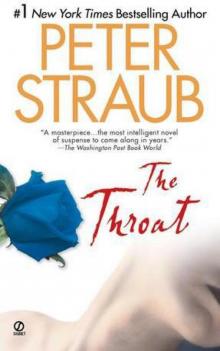 The Throat
The Throat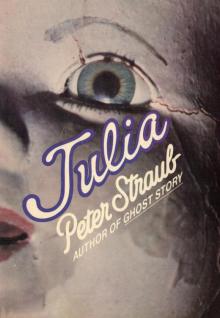 Julia
Julia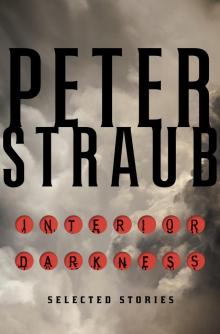 Interior Darkness: Selected Stories
Interior Darkness: Selected Stories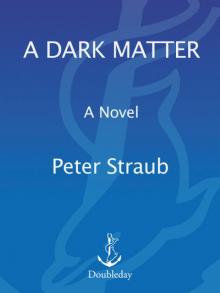 A Dark Matter
A Dark Matter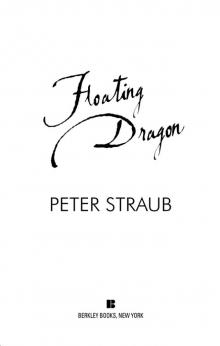 Floating Dragon
Floating Dragon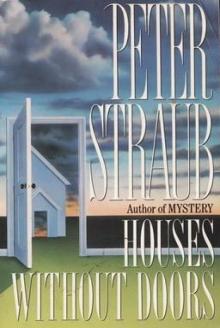 Houses Without Doors
Houses Without Doors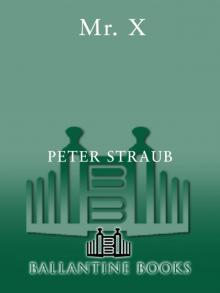 Mr. X
Mr. X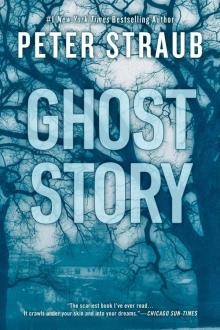 Ghost Story
Ghost Story Mystery
Mystery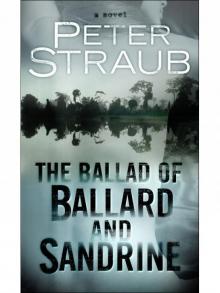 The Ballad of Ballard and Sandrine
The Ballad of Ballard and Sandrine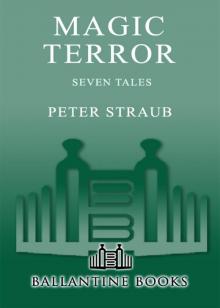 Magic Terror
Magic Terror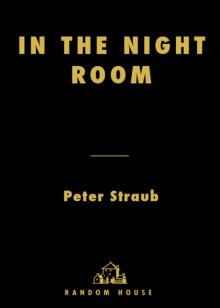 In the Night Room
In the Night Room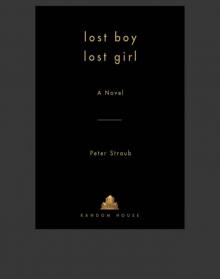 Lost Boy Lost Girl
Lost Boy Lost Girl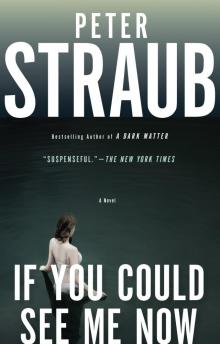 If You Could See Me Now
If You Could See Me Now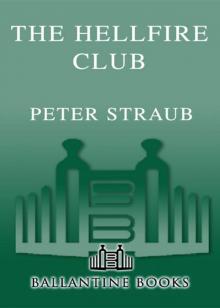 The Hellfire Club
The Hellfire Club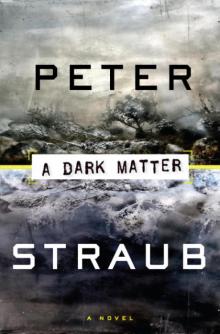 A Dark Matter: A Novel
A Dark Matter: A Novel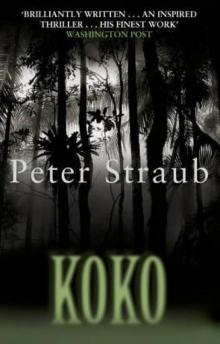 Koko brt-1
Koko brt-1 Shadowland
Shadowland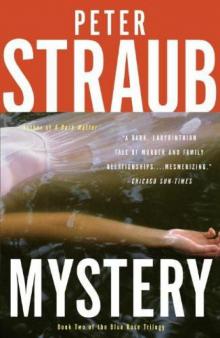 Mystery brt-2
Mystery brt-2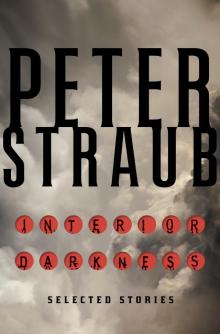 Interior Darkness
Interior Darkness Poe's Children
Poe's Children